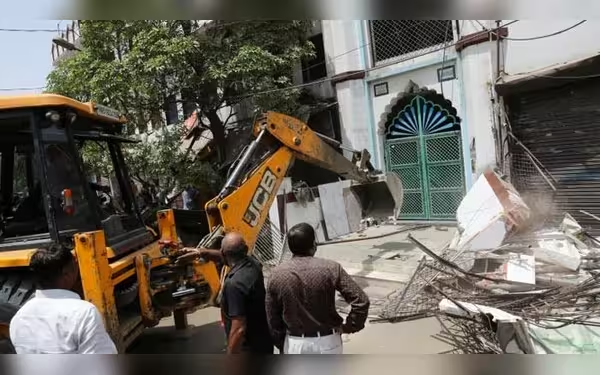Saturday, November 16, 2024 05:26 PM
Indian Supreme Court Criticizes Property Demolitions Targeting Minority Muslims
- Supreme Court disapproves of property demolitions in India.
- Demolitions disproportionately affect minority Muslim communities.
- Government claims demolitions comply with local laws.
 Image Credits: thenews.com.pk
Image Credits: thenews.com.pkIndian Supreme Court criticizes property demolitions affecting minority Muslims, raising concerns over justice and fairness in law enforcement.
MUMBAI: The issue of property demolitions in India has recently come under intense scrutiny, particularly concerning the treatment of minority communities. On Monday, the Supreme Court of India expressed strong disapproval of state actions that have led to the demolition of properties belonging to individuals accused of criminal activities. Critics argue that these demolitions disproportionately affect minority Muslims, raising serious concerns about fairness and justice in the enforcement of laws.
The Indian government, particularly the ruling Bharatiya Janata Party (BJP), has firmly rejected these allegations. They maintain that the properties in question were demolished because they violated local laws and that the owners had been duly notified prior to these actions. This defense, however, has not quelled the growing discontent among various groups who believe that the demolitions are a targeted effort against specific communities.
In recent years, there have been numerous instances where properties belonging to individuals from minority backgrounds have been demolished under the pretext of law enforcement. This has led to a perception that the legal system is being misused to marginalize certain groups. The Supreme Court's remarks highlight the need for a more equitable approach to law enforcement, one that does not discriminate based on religion or community.
As the debate continues, it is essential for citizens to remain informed about their rights and the legal processes that govern property ownership and demolition. The Supreme Court's intervention serves as a reminder that justice must be blind and that all individuals, regardless of their background, deserve fair treatment under the law. The ongoing discussions surrounding this issue will likely shape the future of property rights and community relations in India.
The demolition of properties, especially those belonging to minority communities, raises significant ethical and legal questions. It is crucial for the government to ensure that its actions are just and transparent, fostering an environment where all citizens feel secure in their rights. As this situation unfolds, it will be interesting to see how the judiciary and the government navigate these complex issues, ultimately striving for a society that upholds justice for all.













